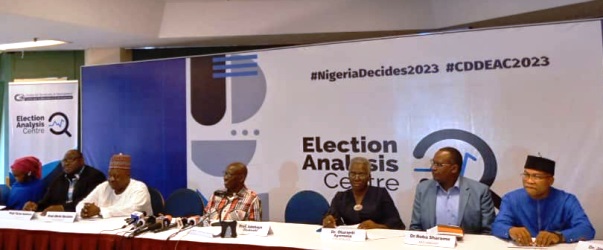The Centre for Democracy and Development (CDD) has tasked the Independent National Electoral Commission (INEC) to communicate regularly with Nigerians on the electoral processes to enhance its credibility.
The Centre said this at the opening of its Election Analysis Centre (EAC) in Abuja on Thursday jointly signed Prof. Adele Jinadu, the Chairman, CDD Electoral Analysis Centre (CDD-ESC) and Idayat Hassan, Director, CDD.
Reading the document Jinadu outlined five key issues, which would determine the voting patterns and the outcome of the 2023 election.
He said that to enhance the credibility of the election, CDD-EAC encouraged key stakeholders to take some steps.
“INEC should continue to communicate regularly with Nigerians about the ongoing election process and is as transparent as possible during the collation and announcement of results.
“The government should ensure INEC and the security agencies have the necessary resources at their disposal to roll out their comprehensive plans for election day operations that ensure polls take place in a safe, free and fair environment.
“CDD, is deploying a total of 4,993 trained and accredited observers, data clerks and fact-checkers and social media monitors for both the presidential, legislative and governorship elections,” he said.
Jinadu said CDD assessed the election as one that would be closely contested by the four leading candidates.
“The five issues, which could determine these elections are encapsulated in the 5 Is, which are identity, insecurity, institutions, information disorder and inter and intra party squabbles.
“The CDD noted that while Nigerians embrace multiple identities, the election campaign and the political conversation has tended to sharpen divisions along these lines,” he said.
Jinadu pointed at insecurity as another critical issue, which could impact on the conduct and outcome of the election.
This, he said, was because all the six geopolitical zones in the country were confronted by insecurity, which had led to the deployment of the military across the federation.
He said CDD identified the role of institutions as crucial to conduct of credible and transparent election.
Jinadu said these included INEC and the security agencies who were faced with the herculean challenge of managing logistics and securing the electoral terrain.
He said that the fourth factor was information disorder, adding that although social media had opened avenues for citizens to engage, the volume of misinformation and disinformation circulating online could also lead to citizen actions based on incorrect information.
He said the fifth and final factor was inter and intra-party squabbles as violence involving political parties increased as contestation intensified within and between groups vying for power, in spite of all parties signing the National Peace Accord.
He urged political parties to ensure that their members and supporters adhered to the conditions laid out in the National Peace Accord throughout the voting process and after the announcement of results.
He said that the Inter-Agency Consultative Committee on Election Security should also ensure that all security personnel on electoral duty adhered to the agreed code of conduct and rules of engagement.
Jinadu said that social media companies should support the work of fact-checking organisations by promptly taking down digital content that promotes political disinformation or hate speech that relates to the election.
He called on Nigerian voters and those in the Diaspora to critically assess information that they receive about the election before sharing to prevent the spread of malicious information about the election.


